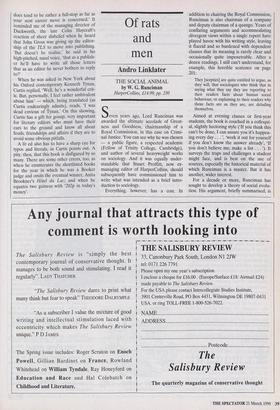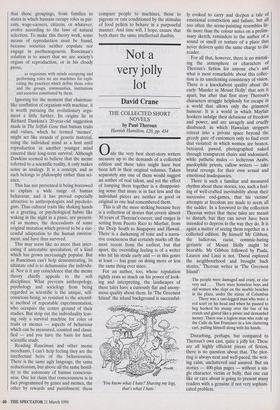Of rats and men
Andro Linklater
THE SOCIAL ANIMAL by W. G. Runciman HarperCollins, £14.99, pp. 230 even years ago, Lord Runciman was awarded the ultimate accolade of Great- ness and Goodness, chairmanship of a Royal Commission, in this case on Crimi- nal Justice. You can see why he was chosen — a public figure, a respected academic (Fellow of Trinity College, Cambridge), and author of several heavyweight works on sociology. And it was equally under- standable that Stuart Proffitt, now ex- managing editor of HarperCollins, should subsequently have commissioned him to write what was intended as a brief intro- duction to sociology.
Everything, however, has a cost. In addition to chairing the Royal Commission, Runciman is also chairman of a company and deputy chairman of a quango. Years of conflating arguments and accommodating divergent views within a single report have played havoc with his writing style, leaving it flaccid and so burdened with dependent clauses that its meaning is rarely clear and occasionally quite impenetrable. After a dozen readings, I still can't understand, for example, this horrible sentence on page 201: They [sceptics] are quite entitled to argue, as they will, that sociologists who think that in saying what they say they are reporting to their readers facts about human social behaviour, or explaining to their readers why those facts are as they are, are deluding themselves.
Aimed at evening classes or first-year students, the book is couched in a colloqui- al, slightly hectoring style (If you think this can't be done, I can assure you it's happen- ing every day . . . 'work it out for yourself if you don't know the answer already', 'If you don't believe me, make a list . . . '). It surveys the traps and challenges a student might face, and is best on the use of sources, especially the historical material of which Runciman is a master. But it has another, wider interest.
For a decade or more, Runciman has sought to develop a theory of social evolu- tion. His argument, briefly summarised, is that those groupings, from families to states in which humans occupy roles as par- ents, wage-earners, citizens, or whatever, evolve according to the laws of natural selection. To make this theory work, some means of reproduction must be found, because societies neither copulate nor engage in parthenogenesis. Runciman's solution is to assert that we are society's organs of reproduction, or in his cloudy prose,
. . . as organisms with minds occupying and performing roles we are machines for repli- cating the practices which define those roles and the groups, communities, institutions and societies constituted by them.
Ignoring for the moment that chairman- like conflation of organism with machine, it is worth pursuing the evolutionary argu- ment a little further. Its origins lie in Richard Dawkins's 20-year-old suggestion made in The Selfish Gene that human traits and values, which he termed `memes', might act like strands of genetic material, using the individual mind as a host until reproduction in another younger mind ensured their long-term survival. Although Dawkins seemed to believe that the meme referred to a scientific reality, it only makes sense as analogy. It is a concept, and as such belongs to philosophy rather than sci- ence.
This has not prevented it being borrowed to explain a wide range of human behaviour, and it has proved especially attractive to anthropologists and psycholo- gists. Thus cultural traits like shaking hands as a greeting, or psychological habits like waking in the night in a panic, are present- ed as memes, the descendants of some original mutation which proved to be a suc- cessful adaptation to the human environ- ment, and have thus survived.
This may seem like no more than inter- esting if untestable speculation, of a kind which has grown increasingly popular. But as Runciman can't help demonstrating, its ultimate end is to dehumanise the individu- al. Nor is it any coincidence that the meme theory chiefly appeals to the soft disciplines. What prevents anthropology, psychology and sociology from being regarded as scientific is the unique, self- conscious being, so resistant to the scientif- ic method of repeatable experimentation, who occupies the centre ground of their studies. But strip out the individuality leav- ing only a survival machine for roles or traits or memes — aspects of behaviour which can be measured, counted and classi- fied — and you have the basis for hard, scientific study.
Reading Runciman and other meme merchants, I can't help feeling they are the intellectual heirs of the behaviourists. There is the same ugly language, the same reductionism, but above all the same hostil- ity to the autonomy of human conscious- ness. One lot claim that consciousness is in fact programmed by genes and memes, the other by rewards and punishment; these compare people to machines, those to pigeons or rats conditioned by the stimulus of food pellets to behave in a purposeful manner. And time will, I hope, ensure that both share the same intellectual dustbin.





































































 Previous page
Previous page